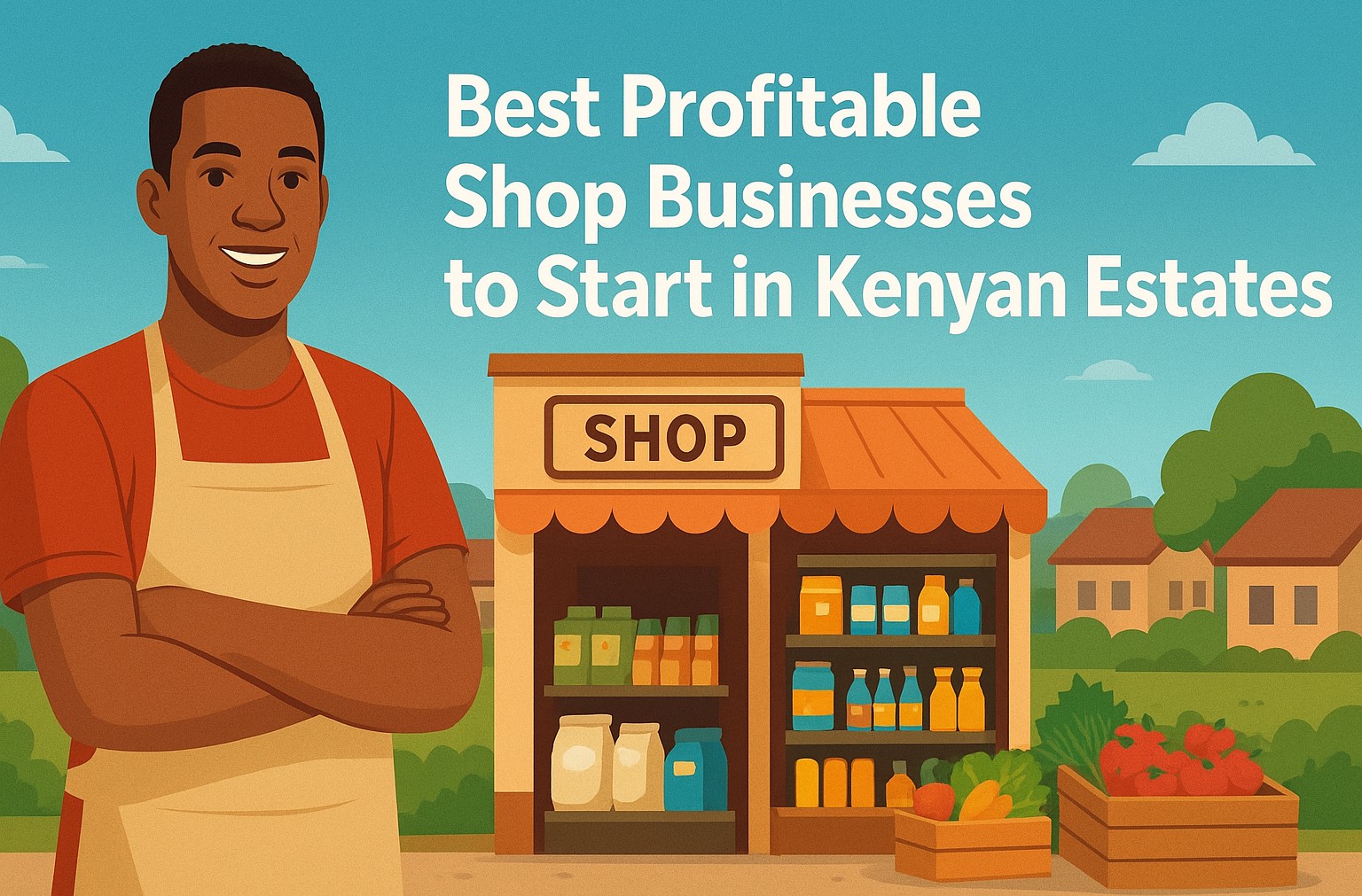

Titus Morebu
Author
Best Profitable Shop Businesses to Start in Kenyan Estates 💡
Discover top shop ideas you can launch in Kenyan estates with low capital yet high returns — practical, scalable, estate-friendly business models.
In neighborhoods across Kenya — from Nairobi’s sprawling estates to developing urban suburbs — there lies vast opportunity for small-scale shop businesses that serve local needs. These “estate shops” can thrive with modest capital, steady foot traffic, and smart positioning. Below are the **most profitable shop business ideas** suited to Kenyan estates today, how to start them, and strategies to scale. 🚀
What Makes a Shop Business Succeed in Kenyan Estates?
Before diving into ideas, understand these key success factors:
- Proximity to customers: The closer, the better. Residents prefer walking distance essentials.
- Necessity-driven products or services: Goods people need every day — food, cleaning, mobile top-up, etc.
- Turnover speed: Low-margin but fast-selling items often outperform high-margin but slow-moving ones.
- Trust, convenience & credit: In estates, credit sales (for trusted clients) and consistency help build loyalty.
- Adapt to local habits: Know what your people eat, what they lack, what they complain about.
Top Profitable Shop Business Ideas for Estates 🏘️
1. Mini Grocery / General Store (“duka”)
Perhaps the classic and most resilient estate business. Every estate needs a place to buy maize flour, sugar, cooking oil, soap, snacks, milk, etc.
- Stock smartly: Fast-moving staples, affordable brands, small packaging.
- Offer small credit: For known clients, you can allow “salio” (debt) to increase sales.
- Bundle deals: “Buy 2, get 100 sh off” helps move more stock.
- Vertical expansion: Add fresh produce, cold drinks, airtime, mobile accessories.
2. Mobile Money / Agency Banking Shop
With mobile money deeply embedded in Kenyan daily life, setting up a shop that serves as an M-Pesa or Airtel Money agent is ideal.
- You’ll earn commission per transaction (send, withdraw, pay bills).
- Keep adequate liquidity (cash float) to meet demands.
- Operate during peak hours (morning, lunch, evening).
- Offer complimentary services: photocopying, bill payments, SIM sales.
3. Kiosk / Fast Food Shop
Food sells fast in estates. People want affordable meals near home.
- Staple local favorites: ugali & stew, rice, chapati, mandazi, street snacks.
- Keep hygiene and consistent taste — word spreads fast.
- Use takeaway-friendly packaging.
- Special deals at lunch or evening dinner rush hours.
4. Posho Mill / Grain Milling and Packaging
Many estate residents buy maize grain to mill into flour (“posho”) rather than prepackaged maize flour.
- Offer milling by weight and packaging in small bags.
- Sell supplementary items like fortified flour, salt, or local flour blends.
- Charge per kilogram or per bag.
5. Phone Accessories & Repairs Shop
Smartphones are ubiquitous; their accessories and repair services are always in demand.
- Stock chargers, screen protectors, covers, earphones, SIM adapters.
- Offer simple repair services: screen fix, battery replacement, software reset.
- Ensure you have tools and parts supply chain.
6. Water Vending / Water Refill & Delivery
Safe drinking water is a constant need. Setting up a water refill station or delivery service can be very profitable.
- Install water purification system + refill dispenser.
- Offer jerrycan refills or direct delivery within the estate.
- Offer loyalty discounts for regular customers.
7. Bakery & Pastry Corner
Sweet treats, bread, buns, cakes — always in demand for breakfast, school snacks, and celebrations.
- Start with basic items: bread, buns, doughnuts, small cakes.
- Take special orders (birthday cakes) as side income.
- Sell alongside your kiosk or duka to cross-sell.
8. Cleaning & Detergent Shop
People constantly need cleaning supplies — laundry soap, detergent, disinfectants, etc.
- Sell in small, affordable packages.
- Bundle with general store offerings.
- Offer bulk discounts to landlords or small hostels.
9. Pharmacy / Over-the-Counter Medicines & Wellness Shop
Access to basic medicines, supplements, vitamins, and health products is a strong business in estates.
- Get required licensing and registration with regulatory bodies.
- Stock common OTC medicines, first-aid, herbal remedies, vitamins.
- Offer mini wellness services: blood pressure check, consultations.
10. Stationery, Printing & Photocopy Shop
Students, small offices, entrepreneurs — all need printing, copying, binding, stationery.
- Sell notebooks, pens, cartridges, paper, envelopes.
- Offer photocopying, scanning, lamination, binding services.
- Tap into school needs: exercise books, exam printing, etc.
11. Thrift / Second-Hand / Mitumba Clothing Shop
Estate residents love budget clothing. Mitumba (used clothing) stores are staples.
- Import quality bales and sort carefully.
- Display and price clearly.
- Complement with tailoring/alterations to boost value.
12. Beauty / Barber / Salon Shop
Every estate needs haircuts, grooming, manicure, hairstyling.
- Offer male, female, children’s haircut services.
- Sell hair products (shampoos, creams, oils).
- Incorporate mobile grooming (home visits) for extra income.
How to Choose the Right Shop Business for Your Estate
- Survey the area: walk around, talk to neighbors, list frequently missing goods or services.
- Check competition: avoid markets oversaturated; choose niches less served.
- Start lean: focus on a subset of services first — you can expand later.
- Leverage cross-selling: combine complementary services (e.g. duka + mobile money + accessories).
- Build rapport: offer credit carefully, deliver reliably, be friendly.
Marketing & Growth Strategies
Even hyperlocal shops benefit from modern marketing tactics:
- Use WhatsApp groups or Telegram: send daily specials to nearby residents.
- Flyers & posters: place simple advert flyers at gatehouses, bus stops, churches.
- Referral discounts: customers bring new clients, get a small discount.
- Bundle & combo offers: e.g. “bread + margarine + milk” at a lower rate.
- Host sampling days: free taste or mini promotion for new items.
Financial & Operational Tips
- Bookkeeping from day one: track sales, cost of goods sold, expenses.
- Maintain safety stock: always have buffer stock for staples to avoid stockouts.
- Negotiate supplier credit: delay payments to suppliers when possible.
- Reinvest profits: expand stock, improve shop appearance, open branch.
- Stay compliant: register your business, pay necessary fees, follow county rules.
Scaling & Diversifying
Once your first shop is stable, scale by:
- Opening satellite micro-shops in adjacent blocks or compounds.
- Adding delivery service to doorsteps within the estate.
- Introducing digital payments or integrating with logistics platforms.
- Adding value-added services: small repairs, tailoring, home care.
Conclusion
Kenyan estates are alive with everyday needs and unmet conveniences. The best shop businesses are those that respond to the daily rhythms of the people around you — the food they eat, the water they drink, the phones they use, and the services they require. Start with a focused niche, build trust, maintain adaptability, and reinvest wisely. Your humble estate shop can evolve into a local institution and a thriving enterprise. Best of success! 💪
For further reading, explore government resources on small business support, enterprise development hubs in your county, and microloan programmes available to youth and women in Kenya.
Gallery

Related Articles
3 articles
How TitoCreations Empowers Kenyan Entrepreneurs With Smart Business Systems
Discover how TitoCreations equips Kenyan entrepreneurs with profitable business ideas and modern software systems to start, manage, and scale successful ventures.

How to Start Poultry Farming in Kenya 2026: A Complete Step-by-Step Guide to Profit
Learn how to start and run a profitable poultry farm in Kenya in 2026 with up-to-date setup, costs, management, marketing, and profit strategies.

Freelancing in Kenya: How to Start With No Experience 2026
Learn how to start freelancing in Kenya with zero experience, build marketable skills, find clients, and earn KES or dollars online in 2026.